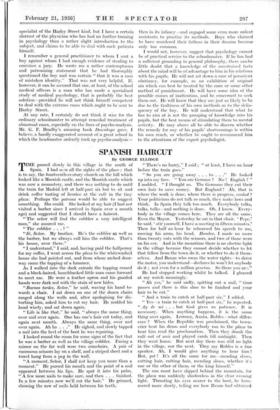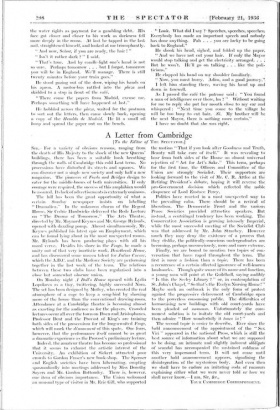SPANISH HAIRCUT
By GEORGE ELLIDGE
TIME passed slowly in this village in the south of Spain. I had seen all the sights of the place : that is to say, the fourteenth-century church on the hill which looked like a Moorish castle, and the Moorish castle which was now a monastery, and there was nothing to do until the train for Madrid left at half-past six but to sit and drink coffee tasting of licorice at the café in the tiny plaza. Perhaps the patron would be able to suggest something. She could. She looked at my hair (I had not visited a barber since I arrived in Spain over a month ago) and suggested that I should have a haircut.
" The senor will find the cobbler a very intelligent man," she assured me.
" The cobbler . . . ? "
"Si, Senior. My brother. He's the cobbler as well as the barber, but we always call him the cobbler. That's his house, over there."
"I understand," I said, and, having paid the halfpenny for my coffee, I went across the plaza to the whitewashed house she had pointed out, and from whose arched door- way came the tapping of a hammer.
As I walked into the dark entrada the tapping ceased and a black-haired, hunchbacked little man came forward to meet me. He wore a leather apron and his gnarled hands were dark red with the stain of new hides.
"Buenas tardes, Senor," he said, waving his hand to- wards a chair. I sat down on one of the dozen chairs ranged along the walls arid, after apologising for dis- turbing him, asked him to cut my hair. He nodded his head wisely, and sat down again.
" Life is like that," he said, " always the same thing, over and over again. One has one's hair cut today, and again next 'month. Always the same thing, over and over again. Ah ha . . ." He sighed, and slowly tapped a nail into the heel of the lisoOt he was repairing.
I lOoked round the room for some signs of the fact that he was a barber as well as the village cobbler. Facing a mirror on the far wall were two armchairs. A pair of enormous scissors laS, on a shelf, and a striped sheet and a towel hung from a peg in the _wall. "A moment, Senor, I shall not keep you more than a moment." He pursed his mouth and the point of a nail appeared between his lips. Be spat it into his palm. " A few more nails to make sure, and then .. . finished. In a few minutes pow we'll cut the hair." He grinned, shOwing 'the row of nails field between his teeth. " There's no hurry," I said ; " at least, I have an hour before the train goes."
" So you are going away . . . to . . ." He looked up into my face. " You are German ? No ! English ? I nodded. " I thought so. The Germans they cut their own hair to save money. But England ! Ah, that is where the work is done, where there is progress, verdad ? Your politicians do not talk so much, they make laws and think. In Spain they talk too much. Everybody talks, talks, talks—and nothing is done. Oh, I know. Every- body in the village comes here. They are all the same. Even the Mayor. Yesterday he sat in that chair. ` Pepe,' he said, ` stir yourself, I have a meeting in fifteen minutes.' Then for half an hour he rehearsed his speech to me, moving his arms, his head. Ilombre, I made no more than twenty cuts with the scissors, and two of those were on his ear. And in the meantime there is no electric light in the village because they cannot decide whether to let that fellow from the town do it, or whether to do it them- selves. And Bauza who owns the water rights—to drive the motor, you understand—declares he won't let anybody do it ; not even for a million pesetas. So there you ar.."
He had stopped working whilst he talked. I glanced at my watch meaningly.
" Ah yes," he said sadly, spitting out a nail, " time passes and _there is this shoe to be finished and your hair to be cut."
" And a train to catch at half-past six," I added.
" Yes—a train to catch at half-past six," lie repeated. " Ay de mi . . . but God gives us patience. It is necessary. When anything happens, it is the same thing over again. Lerroux, Azana, Robles—what differ- ence ? When the Republic was proclaimed, the town- crier beat his drum and everybody ran to the plaza to hear him read the proclamation. Then they drank the cafe out of anis and played cards till midnight. Then they went home.' But next day there was still no light in the village, nor the next. They say Robles is a fine speaker. Ah, I would give anything to hear him ! But, pst ! . It's all the same for me—mending shoes, cutting hair, cutting hair, mending shoes, whether it's one or the other of them, or the king himself."
The sun must have slipped behind the mountain, for the plaza was suddenly shadowless in the clear evening light. Thrusting his eyes nearer to the boot, he ham- mered more slowly, telling me how Bauza had obtained the water rights as - payment for a gambling • debt.• .11is face got closer and closer to his work as darkness fell more deeply in the room. At last he tapped in the last. nail, straightened himself, and looked at me triumphantly.
" And now,' Senor, if 'you arc ready, the hair !
" Isn't it rather dark ? " I said.
" That's true. And by candle-light one's hand is not so sure. Perhaps tomorrow . . . but I forgot, tomorrow you will he in England. We'll manage. There is still twenty minutes before your train goes." - He stood gazing out of the door, wiping his hands on his apron. A motor-bus rattled into the plaza and Skidded to a stop in front of the café.
" There come the papers from Madrid, excuse me. Perhaps something will have happened at last".
. Ile hobbled across the plaza, waited for the postman to sort out the letters, then came slowly back, opening a copy . of the Ileraldo de Madrid. He lit a small oil Jamp and spread the paper out on the bench. . • " Look. What did Isay.?'Spetcheti-Speeehes; Speeches:. Everybody has made an important speech and nobody has done anything. Pah . . . you arc lucky to be going back to England."
He shook his head, sighed, and folded up the paper: " And we have not cut' your hair. If -only the Mayor would stop talking and get the electricity arranged..'. : But he won't. He'll go on talking . . like the 'poli- ticians."
He clapped his hand on my shoulder familiarly.
" Now, you must hurry. Adios, and a good journey.", I left him standing there, waving his hand, up and down in farewell.
As I passed the cafe the patrona said : " You found a man of intelligence over there, hn ? " Without waiting for me to reply- she put her mouth close to my ear and whispered : "Next time you conic to the village he will -be too :busy to cut hair.- Si.- My brother will be the next Mayor, there is nothing more certain."
I have no doubt that She was- right.















































 Previous page
Previous page